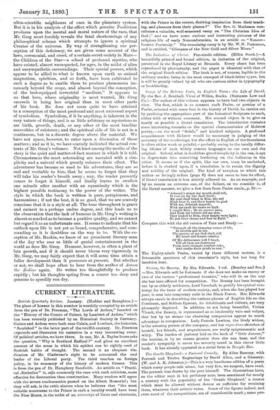CURRENT LITERATURE.
British Quarterly Review. January. (Hodder and Stoughton.)— The place of honour in this number is worthily occupied by an article from the pen of Dr. Freeman, "The Lords of Ardres," founded on the "History of the Counts of Gaines, by Lambert of Ardres," which has been recently published by an Historical Society in Germany. Gaines and Ardres were both near Calais, and Lambert, the historian, "flourished" in the latter part of the twelfth century. Dr. Freeman expounds and illustrates his narrative in a very interesting essay. Of political articles, we have three. In one, Mr. A. Taylor Innes asks the question, "Why is Scotland Radical ?" and gives an excellent account of the sense in which his epithet can be rightly used of Scottish habits of thought. The second is an eloquent vin- dication of Mr. Gladstone's right to be accounted the real leader of the Liberal party. The third touches on foreign policy, in its summary of the history of modern Greece. This is from the pen of Dr. Humphrey Sandwith. An article on " Practi- cal lEsthetics" is, asl,is commonly the case with such criticism, more effective for destruction than construction. Many readers will agree with the severe condemnation passed on the Albert Memorial ; but they will ask, is the critic sincere when he believes that "the most suitable monument to the Prince in such a locality would have been the Nine Muses, in the midst of an entourage of limes and chestnuts,
with the Prince in the centre, deriving inspiration from their teach- ing, and pleasure from their glance P" The Rev. G. Matheson con- tributes a valuable, well-seasoned essay on "The Christian Idea of God ;" and we have some curious and interesting pictures of the religions life of early Nonconformists, in an article on "Noncon- formist Psalmody." The remaining essay is by Mr. W. H. Patterson, and is entitled, "Glimpses of the New Gold and Silver Alines."


































 Previous page
Previous page